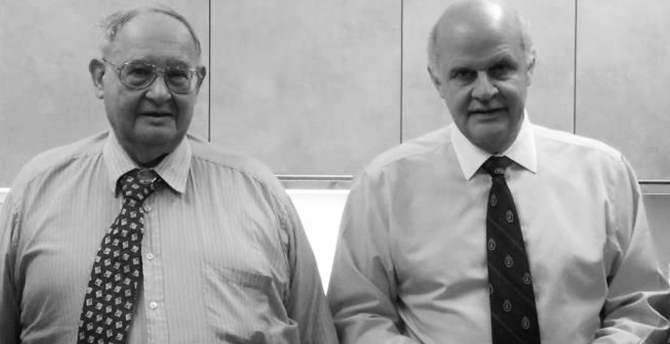
The free society lost a great champion on Tuesday, October 14, 2014 when Leonard P. Liggio passed away. I first met Leonard P. Liggio in 1980 at a Mont Pelerin Society (MPS) meeting held at the Hoover Institution. He was standing on the left side of the packed auditorium next to Murray Rothbard, another intellectual giant, much smaller in size, but similar in their passion to understand and promote liberty. At the time Liggio was president of the Institute for Humane Studies (I.H.S.). At the time of his passing, he was vice president of the Atlas Network, which as I.H.S. relocated to Northern Virginia and, for some years, shared offices near George Mason University. John Blundell (1952-2014), who succeeded Liggio as president of I.H.S., also became president of Atlas Network (1988-1991), and had an outstanding relationship with him.
From the moment of our arrival in Virginia I worked daily with Leonard on different projects. With his deep and encyclopedic historical knowledge he complemented and enlightened Atlas Network’s work to create and nurture public policy think tanks. His understanding of the evolution of legal institutions helped me and many others put our economic and policy arguments into a better perspective.
In 1990, Manuel Ayau (1925-2010), the founder and late president of the Universidad Francisco Marroquín in Guatemala, asked Leonard and I to help him build the program of a regional MPS meeting. Although the topic always led to major disagreements among classical liberals, we organized a panel on religion and liberty. We invited Father Robert Sirico to speak. That meeting led to conversations among us and eventually to the founding of the Acton Institute for the Study of Religion and Liberty. The co-founders, Sirico and Kris Mauren asked us to become founding trustees. Our next joint effort was in 1993 with Tony Sullivan, then at the Earhart Foundation developing a program to promote classical liberal ideas among the Muslim world. We provided advice and some support to The Minaret of Freedom Institute founded later that year.
After a restructuring of I.H.S. in 1988, Atlas had a chance to bring Liggio onto its team. I.H.S. focused on scholars, and Atlas on think tanks, but the latter needed the input and academic guidance of figures like Leonard. Plus, a new crop of intellectual entrepreneurs working at universities, would profit from having such a talented and generous scholar helping them multiply their impact. Seeing its enhanced academic capital, the John Templeton Foundation asked Atlas to administer the Templeton Freedom Project, which focused on teaching the principles of the free society at universities in the U.S. and across the globe. Those investments continue to bear fruit.
Describing Liggio’s affiliations and saying a few words about their relevance would fill an academic paper. Think tanks and academic societies in Austria, Italy, Liechtenstein, France, Portugal, Turkey and the United Kingdom benefitted from his advice and knowledge. He had a stellar career in the United States. In addition to I.H.S., he was president of the MPS, the Philadelphia Society, vice president of the Cato Institute and the Atlas Network, and a trustee of the Competitive Enterprise Institute. Also, Leonard and I were involved in the early discussions of the Christian, conservative think tank at Grove City College: The Center for Vision & Values.